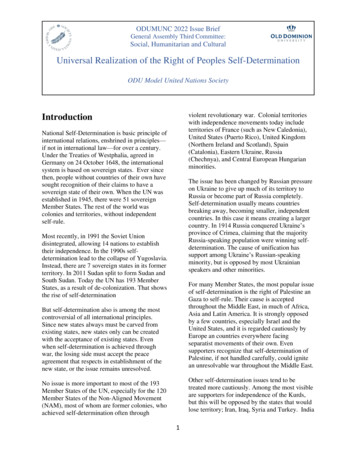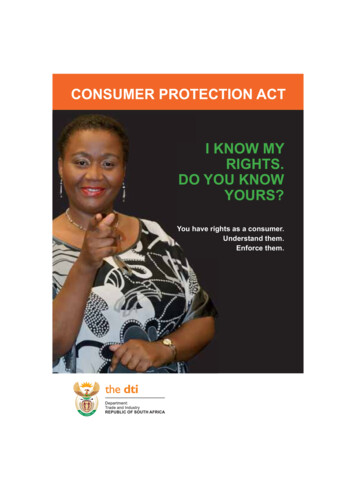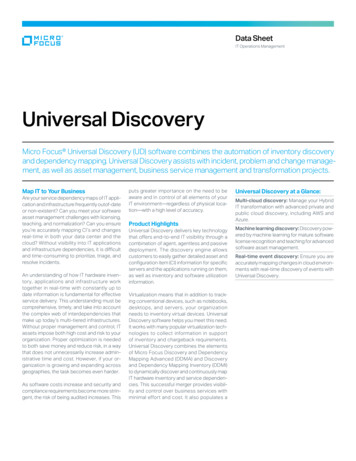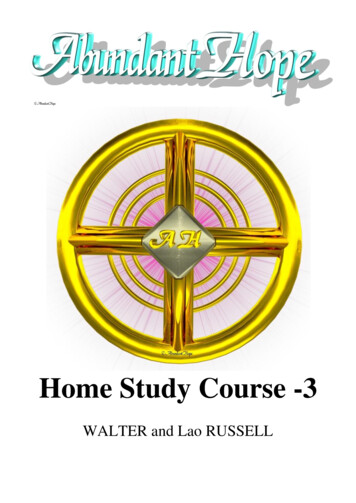
Transcription
ODUMUNC 2022 Issue BriefGeneral Assembly Third Committee:Social, Humanitarian and CulturalUniversal Realization of the Right of Peoples Self-DeterminationODU Model United Nations Societyviolent revolutionary war. Colonial territorieswith independence movements today includeterritories of France (such as New Caledonia),United States (Puerto Rico), United Kingdom(Northern Ireland and Scotland), Spain(Catalonia), Eastern Ukraine, Russia(Chechnya), and Central European Hungarianminorities.IntroductionNational Self-Determination is basic principle ofinternational relations, enshrined in principles—if not in international law—for over a century.Under the Treaties of Westphalia, agreed inGermany on 24 October 1648, the internationalsystem is based on sovereign states. Ever sincethen, people without countries of their own havesought recognition of their claims to have asovereign state of their own. When the UN wasestablished in 1945, there were 51 sovereignMember States. The rest of the world wascolonies and territories, without independentself-rule.The issue has been changed by Russian pressureon Ukraine to give up much of its territory toRussia or become part of Russia completely.Self-determination usually means countriesbreaking away, becoming smaller, independentcountries. In this case it means creating a largercountry. In 1914 Russia conquered Ukraine’sprovince of Crimea, claiming that the majorityRussia-speaking population were winning selfdetermination. The cause of unification hassupport among Ukraine’s Russian-speakingminority, but is opposed by most Ukrainianspeakers and other minorities.Most recently, in 1991 the Soviet Uniondisintegrated, allowing 14 nations to establishtheir independence. In the 1990s selfdetermination lead to the collapse of Yugoslavia.Instead, there are 7 sovereign states in its formerterritory. In 2011 Sudan split to form Sudan andSouth Sudan. Today the UN has 193 MemberStates, as a result of de-colonization. That showsthe rise of self-determinationFor many Member States, the most popular issueof self-determination is the right of Palestine anGaza to self-rule. Their cause is acceptedthroughout the Middle East, in much of Africa,Asia and Latin America. It is strongly opposedby a few countries, especially Israel and theUnited States, and it is regarded cautiously byEurope an countries everywhere facingseparatist movements of their own. Evensupporters recognize that self-determination ofPalestine, if not handled carefully, could ignitean unresolvable war throughout the Middle East.But self-determination also is among the mostcontroversial of all international principles.Since new states always must be carved fromexisting states, new states only can be createdwith the acceptance of existing states. Evenwhen self-determination is achieved throughwar, the losing side must accept the peaceagreement that respects in establishment of thenew state, or the issue remains unresolved.Other self-determination issues tend to betreated more cautiously. Among the most visibleare supporters for independence of the Kurds,but this will be opposed by the states that wouldlose territory; Iran, Iraq, Syria and Turkey. IndiaNo issue is more important to most of the 193Member States of the UN, especially for the 120Member States of the Non-Aligned Movement(NAM), most of whom are former colonies, whoachieved self-determination often through1
Right of Peoples Self-Determinationcontrols most of Kashmir and refuses to considerautonomy or independence. But Kashmiriautonomy—if not outright independence—isstrongly supported by Pakistan other Muslimcountries. European separatist movements suchas Catalonia, Scotland and Hungarian minorityterritories in Romania, Serbia and Slovakia, areless likely to lead to warfare, but will be stronglyopposed by any Member State that fears theprecedent for their own secessionists.Finally, the General Assembly would have tocreate a legal process for recognizing theindependence and sovereignty of groupsclaiming national self-determination.Refuse to resolve the issue generally. Instead,the General Assembly could choose to focusonly on self-determination of a specific group.Possibilities include Palestine and Gaza,Kashmir, and separatist movements in Europe.These initiatives will be popular among theirsupporters, but might be opposed by MemberStates worried about the precedent for their ownterritorial integrity.Some Possible for Actions bythe General AssemblyThe Member States at ODUMUNC have animportant responsibility to address the right ofnational self-dtere4mination. But the MemberStates are divided on who exactly who to applyrecognition to. They are divided on how far theright extends. Does it include all claimants? Justgroups of a certain size of means? Can selfdetermination be granted if the countrycontrolling their territory refuses to grantindependence Some possible paths for UNaction include:Focus on less controversial cases. The UnitedNations have agreed to take a special interest in17 territories who have been promised specialconsideration by the international community.The 17 officially recognized Non-SelfGoverning Territories are: American Samoa,Anguilla, Bermuda, British Virgin Islands,Cayman Islands, Falkland Islands (Malvinas),French Polynesia, Gibraltar, Guam, Montserrat,New Caledonia, Pitcairn, Saint Helena, Tokelau,Turks and Caicos Islands, United States VirginIslands and Western Sahara. The administeringPowers are France, New Zealand, the UnitedKingdom and the United States.Establish universal principles stating when theinternational community will recognize the selfdetermination of particular groups. Criteriamight include permission of Member Stateslosing territory, having a certain threshold forsize, population or wealth, establishingprocedures to mediate or provide peacekeepingin case self-determination creates a threat ofwar. For many Member States, the mostimportant step is a popular vote or referendum,justifying independence. How such votes shouldbe supervised, to permit voting withoutintimidation or violence, to establish minimumthresholds for participation, and determininghow to deal with the results, all are major issues.Commit the international community tooppose further national self-determination,accepting the principle as applied andrecognized so far, by refusing to recognize newclaimants. This might be popular with statesfacing separatist movements. Others will agreethe issue must only be decided liberally, throughpopular consent and agreement, and refuse tosupport such a prohibition. And others, whochampion a particular cause, will be stronglyopposed.2
Right of Peoples Self-DeterminationSelf-determinationComplete text and citations: e right of a people to selfdetermination is a cardinal principle inmodern international law, binding, as such,on the United Nations as authoritativeinterpretation of the Charter's norms. Itstates that peoples, based on respect for theprinciple of equal rights and fair equality ofopportunity, have the right to freely choosetheir sovereignty and international politicalstatus with no interferenceThe concept was first expressed in the1860s, and spread rapidly thereafter. Duringand after World War I, the principle wasencouraged by both Soviet Premier VladimirLenin and United States President WoodrowWilson. Having announced his FourteenPoints on 8 January 1918, on 11 February1918 Wilson stated: "National aspirationsmust be respected; people may now bedominated and governed only by their ownconsent. 'Self determination' is not a merephrase; it is an imperative principle ofaction."During World War II, the principle wasincluded in the Atlantic Charter, declared on14 August 1941, by Franklin D. Roosevelt,President of the United States, and WinstonChurchill, Prime Minister of the UnitedKingdom, who pledged The Eight Principalpoints of the Charter. It was recognized asan international legal right after it wasexplicitly listed as a right in the UN Charter.The principle does not state how thedecision is to be made, nor what theoutcome should be, whether it beindependence, federation, protection, someform of autonomy or full assimilation.Neither does it state what the delimitationbetween peoples should be—nor whatconstitutes a people. There are conflictingdefinitions and legal criteria for determiningwhich groups may legitimately claim theright to self-determination.Broadly speaking, the term selfdetermination also refers to the free choiceof one's own acts without externalcompulsion.3
ODUMUNC 2022 Issue BriefGeneral Assembly Third Committee:Social, Humanitarian and CulturalUniversal Realization of the Right of Peoples Self-DeterminationODU Model United Nations SocietyUnited Nations Support for Self-DeterminationRemains Source of Pride, Crucial Pillar, SaysSecretary-General21 February 2020United Nations support for the right to selfdetermination — while slower than it was at itshistoric peak in the twentieth century — remainsboth a source of pride for the Organization and acrucial pillar of its work going forward,Secretary-General António Guterres told theSpecial Committee on Decolonization today.The Secretary-General was deliveringopening remarks as the 24-member body —known formally as the Special Committee on theSituation with regard to the implementation ofthe Declaration on the Granting of Independenceof Colonial Countries and Peoples — launchedits 2020 session. He said decolonization is oneof the Organization’s most significant historicalchapters, recalling that the United Nations list ofNon-Self-Governing Territories stood at 72 in1946. Today, it is 17.While that achievement is a source of pride,more work remains since the remaining 17Territories are still waiting to realize the promiseof self-government, he emphasized. He recalledthat Timor-Leste was the last Territory removedfrom the list, in 2002, saying: “It is reasonable toask: has the decolonization agenda reached animpasse?” The answer is no, he added, notingthat the South Pacific Territory of NewCaledonia will hold its second referendum onindependence in September.Outlining recent successes, he pointed outthat an unprecedented number of participantsfrom Non-Self-Governing Territories,administering Powers and other stakeholdersattended the Special Committee’s regionalseminar in 2019. In addition, a SpecialCommittee delegation visited the Territory ofMontserrat to gather first-hand information onits political and socioeconomic situation.He went on to emphasize that decolonizationis a process that must be guided by theaspirations and needs of the communities livingin the Non-Self-Governing Territories, who face4
Right of Peoples Self-Determinationvery real and pressing challenges. Many of theTerritories are small islands on the front lines ofclimate change, facing devastating naturaldisasters or struggling to build sustainable andself-sufficient economies, he said, pledging towork alongside the Special Committee “as youmake another push to eradicate colonialism onceand for all”.Newly-elected Chair Keisha McGuire(Grenada) also delivered remarks, agreeing thatdecolonization is still in progress. Against thebackdrop of the seventy-fifth anniversary of theUnited Nations and the impending close of theThird International Decade for the Eradicationof Colonialism, she said, the SpecialCommittee’s members must push forward thefour priorities of her chairmanship: promotingthe Special Committee’s mandate, collaboration,pragmatism, and agility.“But we need to move faster,” sheemphasized, calling upon Member States toaccelerate the recent momentum. Recalling thatthe Special Committee’s 2019 visit toMontserrat was carried out through a creativemix of funding sources in light of the liquiditycrisis plaguing the United Nations, she saidvisiting missions are among the body’s mostvaluable tools.Palestinians appeal for support for UNmember-state bid14 August 2012Palestinian officials want a state of Palestineto have full member status at the UNA senior Palestinian official has askedforeign diplomats in Jerusalem to support arenewed bid for member-state status at theUnited Nations.Hanan Ashrawi, a Palestine LiberationOrganization (PLO) executive committeemember, said such an effort was a "test of globalconsensus and rule of law".She also said the Palestinian Authorityneeded a financial "safety net" in case the UScut off aid because of the bid.The US and Israel are opposed to makingPalestine a full UN member state.Washington says the move would furtherremove the possibility of a permanent peacedeal, and last year suspended its funding ofUnesco after it accepted a membership request.'Co-ordinating efforts'In a speech to envoys from countries inEurope, Latin America, Asia and the MiddleEast in East Jerusalem on Monday, Ms Ashrawiurged them to support the Palestinians' bid to beadmitted to the UN as a "non-member observerstate", an upgrade from the PLO's current statusas a "permanent observer".The request would be put to the UN GeneralAssembly, where approval would require asimple majority of those present. There is no5
Right of Peoples Self-Determinationthreat of veto, as there would be at the SecurityCouncil if the Palestinians sought full memberstate status."In light of the failed peace process and theinability of the international community to holdIsrael accountable for its illegal occupation ofPalestine and its countless unilateral violationsof international and humanitarian law,Palestinians will persist in their efforts to seekstate status, whether in the UN Security Councilor in the UN General Assembly," Ms Ashrawisaid."We reserve the right to undertake diplomaticand non-violent means to approach UN agenciesand organisations for membership, and suchefforts, consistent with the Palestinian people'sright to self-determination and freedom, are atest of global consensus and rule of law.""Even though the timing has yet to bedetermined, we are co-ordinating our effortswith Arab and Muslim countries, as well as withthe international community," she added.The Palestinians have long sought toestablish an independent, sovereign state in theWest Bank, including East Jerusalem, and theGaza Strip.However, two decades of on-and-off peacetalks have failed.The latest round of negotiations broke downin late 2010 over the issue of Jewish settlementbuilding in the West Bank and East Jerusalem.Attempts to restart direct talks have failed.Being a non-member observer state - a statusheld by the Vatican - would improve thePalestinians' chances of joining UN agencies andthe International Criminal Court, although theprocess would be neither automatic norguaranteed.6
ODUMUNC 2022 Issue BriefGeneral Assembly Third Committee:Social, Humanitarian and CulturalUniversal Realization of the Right of Peoples Self-DeterminationODU Model United Nations SocietyIraqi Kurds decisively backindependence in referendum27 September 2017The announcement came despite a lastminute appeal for the result to be "cancelled"from Iraq's prime minister.Haider al-Abadi urged Kurds to insteadengage in dialogue with Baghdad "in theframework of the constitution".Kurdish leaders say the "Yes" vote will givethem a mandate to start negotiations onsecession with the central government inBaghdad and neighbouring countries.Iraq's parliament meanwhile asked the primeminister to deploy troops to the oil-rich region ofKirkuk and other disputed areas held by Kurdishforces.Kurdish Peshmerga fighters took control ofKirkuk, a multi-ethnic region claimed by theKurds and Arab-led central government, whenjihadist militants from so-called Islamic State(IS) swept across northern Iraq in 2014 and theIraqi army collapsed.Kurds took to the streets of Kirkuk on Monday to celebrateafter voting in the referendum. Image source, Getty ImagesPeople living in northern Iraq votedoverwhelmingly in favour of independence forthe Kurdistan Region in Monday's controversialreferendum.The electoral commission said 92% of the3.3 million Kurds and non-Kurds who cast theirballots supported secession.7
Right of Peoples Self-Determination"We will impose Iraq's rule in all districts ofthe region with the force of the constitution," headded.Media caption,Iraq's Kurdish region foreign affairs ministersays independence is 'inevitable'The referendum was held in the three Iraqiprovinces that make up the Kurdistan Region, aswell as "areas of Kurdistan outside the region'sadministration".Electoral commission officials told a newsconference in Irbil on Wednesday afternoon that2,861,000 people had voted "yes" toindependence and 224,000 had voted "no".Turnout was 72.61% among those eligible tovote.In a speech to parliament before the resultwas announced, Mr Abadi insisted that he would"never have a dialogue" about the referendum'soutcome with the Kurdistan RegionalGovernment (KRG).The vote was vehemently opposed byBaghdad and much of the internationalcommunity, which expressed concern about itspotentially destabilising effects, particularly onthe battle against IS.Mr Abadi said his priority now was to"preserve citizens' security" and promised to"defend Kurdish citizens inside or outside" theKurdistan Region.Mr Abadi has demanded that his government be givencontrol of Irbil international airport. Image source, GettyImagesThe prime minister also reaffirmed his threatto prevent direct international flights to theKurdistan Region if Baghdad was not givencontrol of Irbil and Sulaimaniya airports byFriday afternoon.The KRG's transport minister said he wasseeking clarification from Baghdad.8
Right of Peoples Self-Determination"We don't understand how to give them thetwo airports," Mowlud Murad told reporters."They are already subject to the Iraqi CivilAviation Authority."The United States, which was "deeplydisappointed" that the referendum was held, hasalso questioned Mr Abadi's threat to baninternational flights.State department spokeswoman HeatherNauert said on Tuesday that such a move "wouldnot be an example of engaging constructively".Lebanon's Middle East Airlines and EgyptAirmeanwhile warned customers they would haltflights to Irbil from Friday until further notice.Mr Abadi has also demanded control of allborder crossings and oil revenues.Kurds are the fourth-largest ethnic group inthe Middle East but they have never obtained apermanent nation state.In Iraq, where they make up an estimated15% to 20% of the population of 37 million,Kurds faced decades of repression beforeacquiring autonomy in 1991.Tough road ahead for Kashmir separatistmovement after GeelaniAl Jazeera asks region’s analysts and officials about the future of separatist politics after iconicleader Syed Ali Shah Geelani’s death.Geelani died on September 1 after aprolonged illness at his residence in the maincity of Srinagar, where he had been under housearrest for years. He was 92.For decades, Geelani headed the Kashmiriseparatist group, All Parties Hurriyat Conference(APHC), which campaigns for either theregion’s merger with Muslim-majority Pakistanor the creation of an independent nation out ofthe Himalayan territory.Fearing a mass funeral procession over theiconic leader’s demise, Indian authorities“snatched his body” shortly after his death andhurriedly buried it in at night – without even thepresence of his family members.New Delhi also imposed a security lockdownand cut off internet and telephone services inanticipation of demonstrations and protests inthe disputed region over Geelani’s death.The late Syed Ali Shah Geelani, wearing a mask,with Ashraf Sehrai, who died in jail earlier this year,after their Friday prayers in Srinagar in this 2018photo [File: Farooq Khan/EPA]Earlier this month, Indian-administeredKashmir lost its most powerful voice demandingfreedom from New Delhi’s rule: Syed Ali ShahGeelani.9
Right of Peoples Self-DeterminationHis grave continues to be ring-fenced by acontingent of Indian police and paramilitarytroops, with multiple vehicles permanentlystationed outside the graveyard in Srinagar.Three weeks after Geelani’s death, there arequestions in Indian-administered Kashmir overthe future of its separatist movement against abackdrop of a series of repressive steps taken byPrime Minister Narendra Modi’s Hindunationalist government, especially since 2019.In August that year, India unilaterallyscrapped Articles 370 and 35A of the Indianconstitution, which had granted the country’sonly Muslim-majority region – also claimed byneighbouring Pakistan – a degree of autonomy,turning it into a federally governed territory.New Delhi’s most far-reaching move inseven decades of Kashmir struggle was followedby a months-long security lockdown imposed inthe valley and the arrests of hundreds ofKashmiri politicians, rights activists, separatists,lawyers and others.Since then, the Indian government hasimposed new laws governing property and landrights, which the Kashmiris fear aim to changethe demographics of the region.Geelani, many Kashmiris believe, was thelast powerful separatist leader in the region, whoopenly challenged Indian rule and enjoyedoverwhelming local support.He quit the APHC last year but theorganisation did not appoint his successor untilhis death. The new APHC head is 50-year-oldMasarat Alam Bhat, who has spent 17 years ofhis life in prison.Since Bhat remains in jail, many politicalcommentators in Indian-administered Kashmirthink his appointment as the new APHC chiefwill hardly have a significant effect on theground.the 77-year-old second in command, died in jailin May this year.Sehrai was in detention under the draconianPublic Safety Act (PSA), a law that allows aperson to remain imprisoned for up to a yearwithout trial.Bhat, a science graduate, had a brief stintwith armed rebellion against India in his teenageyears before he was arrested and released twoyears later in 1993. After walking free, he cofounded the Muslim League, a pro-freedomgroup that was a part of the APHC.Bhat is considered the brainchild behind thedivision of the umbrella organisation into twofactions – hardliners and moderates – in 2003.After the split, Bhat joined the hardline factionled by Geelani.The hardliners advocated for the resolution ofthe Kashmir dispute under a United NationsWho is Masarat Alam Bhat?Bhat, a Geelani loyalist, is a staunch antiIndia leader who believes Kashmiris should begiven the right to self-determination. He wasexpected to succeed Geelani after Ashraf Sehrai,10
Right of Peoples Self-DeterminationSecurity Council resolution and refused toengage with New Delhi.In April 1948, the UNSC had passed aresolution, asking the governments of India andPakistan to “create proper conditions for a freeand impartial plebiscite to decide whether theState of Jammu and Kashmir is to accede toIndia or Pakistan”.The Hurriyat moderates, on the other hand,used to take part in dialogue with India andPakistan and were open to unconditional talkswith the Indian government.While Bhat has been a part of the separatistpolitics for over two decades, he gainedwidespread popularity in 2010 when he ledthousands of youths in Srinagar who protestedagainst the killing of Tufail Mattoo, a teenager,by the Indian security forces.The agitation continued for months and sawthe killing of more than 100 civilians by Indianforces. As India’s crackdown intensified, Bhatwent underground from where he secretly issuedprotest calendars until he was arrested inOctober 2010.The uprising turned him into a charismaticleader, mainly among the youth in Indianadministered Kashmir.Bhat has been imprisoned since 2015 after hewas booked under the PSA, legislation AmnestyInternational has described as a “lawless law”.Frequently, the PSA against him would berevoked and he would be immediately booked inanother case under the same law.He is currently jailed under a case related toalleged “terror funding”, like many otherseparatist leaders from the region.Kashmir Liberation Front (JKLF) have beenbanned for their “secessionist” ideologies.The beleaguered separatist groups facedanother setback with the death of Geelani, whowas referred to as “Bab” (Father in Kashmiri) byhis supporters.Sheikh Showkat Hussain, political analystand and academic based in the region, saysKashmir’s history has witnessed severalmoments wherein a group’s survival was seenthrough the lens of a popular leader.But, he says, popular sentiments for the rightto self-determination among the region’sresidents have always overshadowed theirleaders.“Sheikh Abdullah abandoned separatism andjoined the state as chief minister in 1975 whenPakistan had lost its eastern wing but resistancedid not die. Rather, Sheikh’s abdication madeseparatism more profound and more mobile,”Hussain told Al Jazeera.In 1975, Kashmiri nationalist SheikhAbdullah signed an accord with the then IndianPrime Minister Indira Gandhi, under which hegave up the demand for independence and tookover the reins of the state.“I don’t think the death of a leader or anyindividual or changing sides by an individual‘Resistance did not die’For the last two years, New Delhi has beensuccessful in maintaining a tight grip on theportion of Kashmir it governs. A crackdown bythe National Investigation Agency (NIA) onseparatist groups resulted in many of theirleaders being thrown into jails over alleged“money laundering” and other cases.Meanwhile, groups such as the socioreligious Jamaat-e-Islami and the Jammu11
Right of Peoples Self-Determinationwill impact the resistance in a big way,” Hussainsaid.Husain believes Bhat’s appointment asGeelani’s successor was “an obvious andexpected move”.“The situation is such that if they appointsomeone who is outside (a jail), he would bearrested. There were two options for the newincumbent if he was outside: either gounderground or get arrested,” he said.“They can’t afford to go undergroundbecause Hurriyat professes to be an aboveground organisation and not involved inunderground activities.”Government officials in the region say theappointment of a jailed leader to head theHurriyat Conference does not make anydifference on the ground.“In the 2010 agitation, Bhat was a massleader. Because of his hawkish stand on certainissues, he was close to Pakistani circles or thosewho subscribed to that ideology,” an official,who refused to be named, told Al Jazeera,calling Bhat “a very honest and upright man”.“But with time the rigidity in his stance onKashmir has slowly diminished. We can’t callhim moderate but the rigid mindset that he hadin the beginning has slowly changed a little bit,”he added.The official said in the current politicalscenario in Indian-administered Kashmir, Bhat’sappointment “means nothing” and “hardlycounts”.“He is in jail and he can’t do anything. Andon the ground, the Hurriyat is dismantled.”Ajai Sahni, executive director of New Delhibased Institute for Conflict Management, told AlJazeera the new APHC leadership cannot meetthe “towering influence” of Geelani.“I don’t think separatists would be able tomake any significant impact on the ground dueto factors such as the loss of Geelani, loss ofpopular support, and the constraints under whichall political activities are operating,” he said.Sahni, however, added that it would bepremature to start making predictions aboutHurriyat’s future.“Given the political situation, the centre’spolicies and the degree with which politicalactivities remain constrained, all these factorswould influence what the Hurriyat will be ableto do,” he said.“Also, Bhat and many Hurriyat leaders arenow involved in criminal cases which willautomatically limit their capacities for an openpolitical activity.”But Siddiq Wahid, a former vice-chancellorof the Islamic University of Science andTechnology and political commentator from thedisputed region, thinks Hurriyat’s “demise hasbeen predicted many times before but suchpredictions reflect more a wish on the part of thepredictors and less the situation on the ground”.12
the rise of self-determination But self-determination also is among the most controversial of all international principles. Since new states always must be carved from existing states, new states only can be created with the acceptance of existing states. Even when self-determination is achieved through war, the losing side must accept the peace











